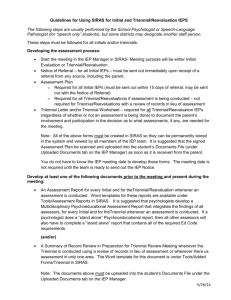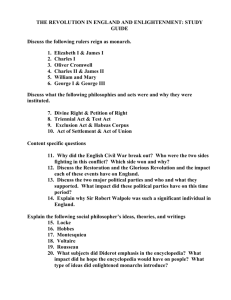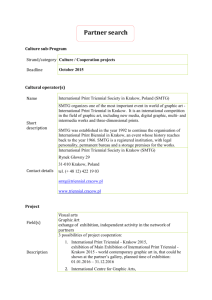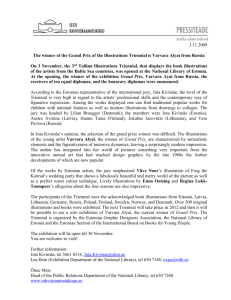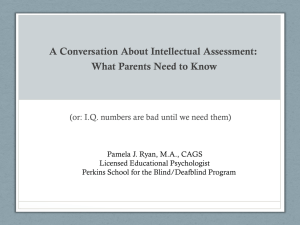Triennial Evaluations - Greenwich Public Schools
advertisement
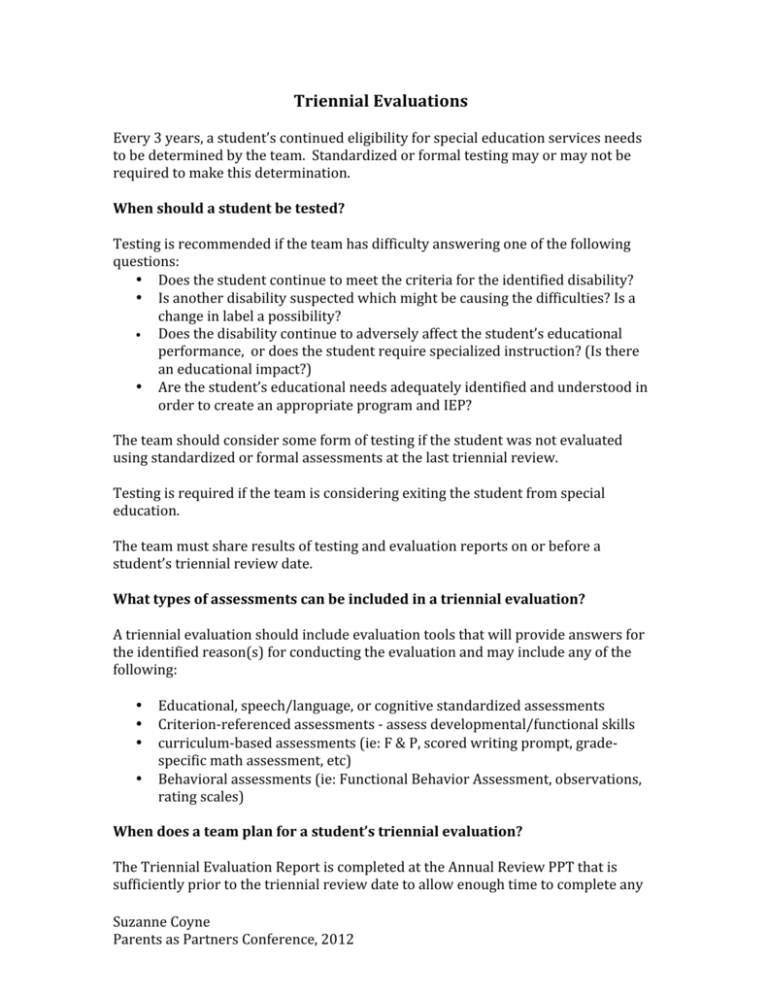
Triennial Evaluations Every 3 years, a student’s continued eligibility for special education services needs to be determined by the team. Standardized or formal testing may or may not be required to make this determination. When should a student be tested? Testing is recommended if the team has difficulty answering one of the following questions: • Does the student continue to meet the criteria for the identified disability? • Is another disability suspected which might be causing the difficulties? Is a change in label a possibility? • Does the disability continue to adversely affect the student’s educational performance, or does the student require specialized instruction? (Is there an educational impact?) • Are the student’s educational needs adequately identified and understood in order to create an appropriate program and IEP? The team should consider some form of testing if the student was not evaluated using standardized or formal assessments at the last triennial review. Testing is required if the team is considering exiting the student from special education. The team must share results of testing and evaluation reports on or before a student’s triennial review date. What types of assessments can be included in a triennial evaluation? A triennial evaluation should include evaluation tools that will provide answers for the identified reason(s) for conducting the evaluation and may include any of the following: • Educational, speech/language, or cognitive standardized assessments • Criterion‐referenced assessments ‐ assess developmental/functional skills • curriculum‐based assessments (ie: F & P, scored writing prompt, grade‐ specific math assessment, etc) • Behavioral assessments (ie: Functional Behavior Assessment, observations, rating scales) When does a team plan for a student’s triennial evaluation? The Triennial Evaluation Report is completed at the Annual Review PPT that is sufficiently prior to the triennial review date to allow enough time to complete any Suzanne Coyne Parents as Partners Conference, 2012 required testing. Parental consent for testing must be taken at this time using the “Notice and Consent to Conduct a Reevaluation” form. If the Triennial Evaluation Report is not completed at the Annual Review, a separate PPT must take place in advance of the Triennial review date to complete this form and plan for the triennial. Sufficient time must be given in order to complete any testing required. Parental consent for testing must be taken at this time. What needs to be done if testing is required? At the PPT in which the Triennial Evaluation Report was completed and testing was recommended, parents must sign the “Notice and Consent to Conduct a Reevaluation” form to give permission to test the student. The team must complete testing and meet on or before the triennial review date to review the results of testing. At this PPT, the team may make recommendations for IEP or program changes based on the results of testing. The “Most Recent Evaluation Date” on page 1 of the IEP is changed to the date of the PPT, and the “Next Triennial Reevaluation Date” is changed to exactly 3 years from this date. What needs to be done if testing is not required? When completing the Triennial Evaluation Report, the team may decide that further assessments are not needed based on the information they already have on the student. If this occurs, then a Triennial Review PPT still needs to be held on or shortly before the Triennial review date to complete the Triennial Final Report. A Triennial Final Report will serve as the student’s triennial evaluation. At the Triennial Review PPT, the “Most Recent Evaluation Date” on page 1 of the IEP is changed to the date of the PPT, and the “Next Triennial Reevaluation Date” is changed to exactly 3 years from this date. Suzanne Coyne Parents as Partners Conference, 2012 Common Standardized Educational Assessments Area Comprehensive (assesses all areas of reading, writing, math, and oral language) Reading Math Suzanne Coyne Parents as Partners Conference, 2012 Possible Tests Weschler Individual Achievement Test III (WiatIII) Woodcock Johnson III‐Revised (WJIII) The Brigance Comprehensive Inventory of Basic Skills‐II ( some standard scores) Gray Oral Reading Test 5 (GORT‐5)‐ assesses reading rate, accuracy, fluency, & comprehension Test of Early Reading Ability 3 (TERA‐3)‐ for ages 3‐ 8 years 6 months; assesses knowledge of the alphabet, conventions, and meaning Phonological Awareness Test‐2 (PAT‐2)‐ up to age 9 years 11 months; assesses phonological processing and phoneme‐ grapheme correspondence. Key Math 3‐ assesses skills in numeration, algebra, geometry, measurement, data analysis & probability, mental computation & estimation, addition & subtraction, multiplication & division, foundations of problem‐solving, applied problem solving Test of Early Math Ability 3 (TEMA‐3)‐ for ages 3‐ 8 years 1 months; assesses skills in mathematical thinking Writing Non‐Standardized Assessments Suzanne Coyne Parents as Partners Conference, 2012 Test of Written Language 4 (TOWL‐4)‐ assesses spelling, punctuation, vocabulary, sentence combining, logical sentences, and narrative writing (grammar/mechanics & story conventions) Test of Early Written Language‐3 (TEWL‐3)‐ ages 3 through 10‐11. Assesses basic writing skills The Assessment of Basic Language and Learning Skills (The ABLLS‐R)‐ This is an assessment, curriculum guide, and skills tracking system for children with more severe language delay, as well as weaknesses in daily living skills. This test helps connect assessment with instruction and monitor progress for IEPs. The Brigance Comprehensive Inventory of Basic Skills‐II‐ grades K‐6‐This is a criterion‐referenced assessment that contains many subtests that identify present levels of academic achievement and functional performance. This test helps connect assessment with instruction and monitor progress for IEPs. Exiting a Student from Special Education What information is used to determine if a student may be ready to be exited from special education? To determine whether exiting a student from special education is a possibility, it is important to review the following to see if they are true about the student: • IEP goals: The student’s goals address grade‐level skills or there are not many identified weaknesses to create goals to address. • IEP services: The student is receiving very little special education or related services and is successful in completing grade‐level expectations. • IEP accommodations/modifications: The student receives very few accommodations/modifications in general education classes is successful in completing grade‐level expectations. • CMT scores: Student is achieving Proficient or above in all areas • Classroom assessments (ie: F & P, writing samples, math assessments): Student is performing on grade level on general education assessments • Report cards: Meeting grade expectations or earning average or above grades • Teacher reports: Student is completing grade‐level assignments with no modifications or accommodations at a level comparable to regular education students in the class What needs to be done if a team is considering exiting a student from special education? A student can be exited at any time, but standardized assessments are required. If exiting is being considered at the time of a student’s Triennial Review, the team must complete the Triennial Review Form and get consent for testing. The team must discuss that exiting the student is a possible outcome. This should be done at the previous Annual Review PPT or at a Triennial Design PPT that allows for sufficient time to complete testing before the Triennial Review date. If the team is considering testing at a time other than a student’s Triennial Review, then the team must have a PPT to discuss the reasons for testing and to obtain parental consent. If the team decides to exit a student from special education, pages 1 and 2 of the IEP must be completed, with the exiting date noted on page 2. ** If a team believes a student is ready to be exited, it is important to pay attention to when they will be articulating to the next school level (ie: 5th to 6th grade or 8th to 9th grade) and plan accordingly for testing and exiting the student. Suzanne Coyne Parents as Partners Conference, 2012
